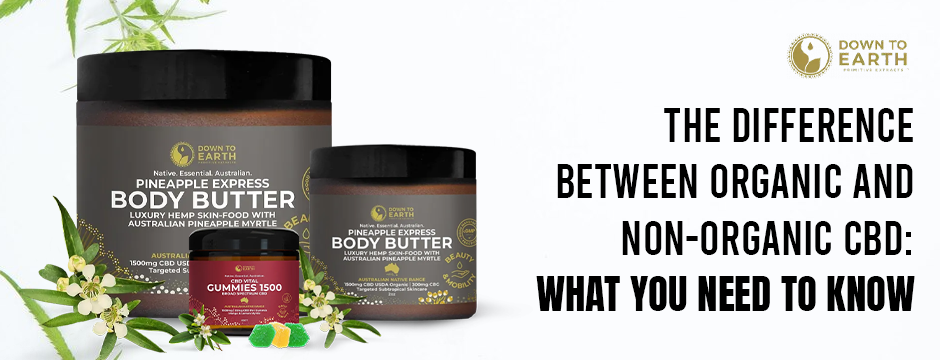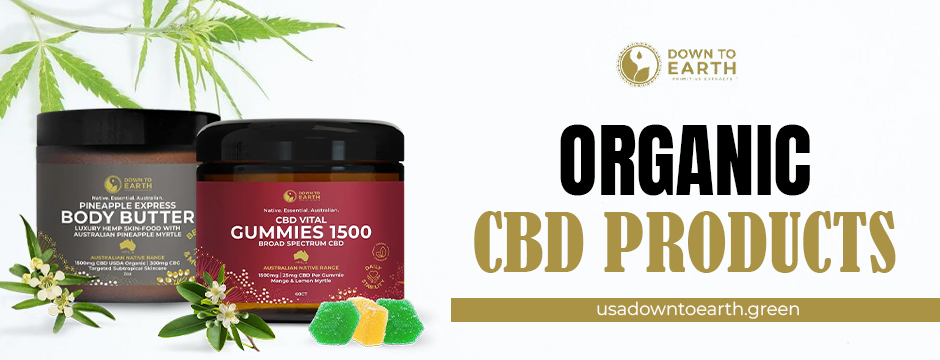
The Difference Between Organic and Non-Organic CBD: What You Need to Know
This is the age of consciousness. People of this decade of this century have become extremely conscious about their health and well-being. Recently, CBD products are becoming popular for those who want to uplift their well-being. CBD products are available in various forms like CBD oils, gummies, capsules, and creams. But the most significant question that users ask is, which product should they use? Non-organic or the organic CBD products.
Here in this article we will talk about the key differences between those, and along with that, we will also talk about the best destination where you can get these products.
The Organic CBD
We all know the fact that, in a product, if we can see the label “organic,” that means it is produced under special farming practices that avoid the use of harmful chemicals. In the case of organic CBD, the organic hemp is generally grown under a pure process where the synthetic pesticides, herbicides, or fertilizers are not used at all.
It also means the plants are “non-GMO.” Non-GMO means this product is not genetically modified and is grown in a way that has not affected the soil itself. If you can see the label of “organic” on any type of CBD product, you have to understand that it is farmed with a clean, sustainable method by being respectful of the environment.
The Difference in Organic CBD
On the other hand, the non-organic CBD comes from the hemp, which is grown in a conventional way. In order to increase the growth and reduce the effect of the pests, the chemical fertilizers, pesticides, and herbicides are generally used to grow hemp.
Non-organic CBD products are easily available in the market, and they are affordable as well. But in terms of purity and environmental impact, one should always opt for organic products.
Farming Practices and Their Impact
The cultivation and harvesting phase of hemp can become the cause of the final product indeed. If one makes the hemp grow organically, it would protect the long-term soil health, prevent soil erosion, and increase the health of local soil. It can give the farmer a giant benefit in future crop yields.
On the other hand, if the crop is farmed in a conventional way, it can definitely harden the soil nutrients, and it can also contaminate water. People of the era of the twenty-first century always prefer sustainable products that do not harm the planet.
If you are interested in contributing to a sustainable brand, then Down To Earth is just that! We are proud sponsors of Gondwana Rainforest Trust who are conservation and regeneration specialists of one of the most important rainforests of our planet – the Daintree Rainforest. Learn more about how we are giving back here.
Quality and Potency: Are They Different?
Some research has begun comparing organic hemp with non-organic hemp for the content of cannabinoids. While the results are unverified and non conclusive, some research suggests slightly higher CBD and other beneficial compounds—terpenes and minor cannabinoids—in hemp that is organically produced. These compounds may influence the manner in which CBD operates in the body and the benefits that can be derived by users.
But let’s also remember that growing techniques are only half of it. Processing and extraction techniques affecting CBD also influence the overall quality of the end product. For example, using CO₂ extraction (which is a pure process) helps preserve more valuable compounds whether hemp is organic or not.
Safety and Testing: What to Look For
Regardless of whether the CBD is organic or non-organic, third-party lab testing is important. They ensure pesticides, heavy metals, mold, bacteria, and other contaminants are identified. A quality CBD product—a good one, either organic or not—is always accompanied by a Certificate of Analysis (COA) from a third-party lab.
Organic CBD may be less likely to get contaminated from cleaner farming practices, but both should be tested anyway. Always make sure there’s transparency of labels and easy access to test reports.
Availability and Cost
One of the primary reasons that there is so much non-organic CBD is that obtaining organic certification takes time, effort, and money. Organic growers have tight guidelines to adhere to and must receive inspections and documentation regularly. It is this additional work that generally adds cost to the end product.
With higher demand for organic CBD products, they are now more accessible by several brands, but the availability is still low compared to regular CBD products. For other customers, the increased cost could be a barrier, but there are some who are also ready to pay a little more for that assurance.
Which One Should You Choose?
Choosing between organic and non-organic CBD ultimately depends on your values and needs. Here are a few things to consider:
- Do you wish to avoid man-made chemicals and support sustainable farming?
- Do you wish for the highest quality and lowest environmental impact?
- Is cost a significant concern for you?
If quality ingredients, earth-friendliness, and better health sound appealing to you, organic CBD products could be worth the investment.
Final Thought
If you are thinking about choosing between non-organic and organic CBD products, this blog will help you. It will always be beneficial for one to choose the organic CBD. To get organic products with CBD, you must visit a reliable website. In this case, Down to Earth would be a dependable destination for you. Visit the site and explore the different products, including CBD oils. Uplift the quality of your life and well-being with our CBD products and feel the difference.
